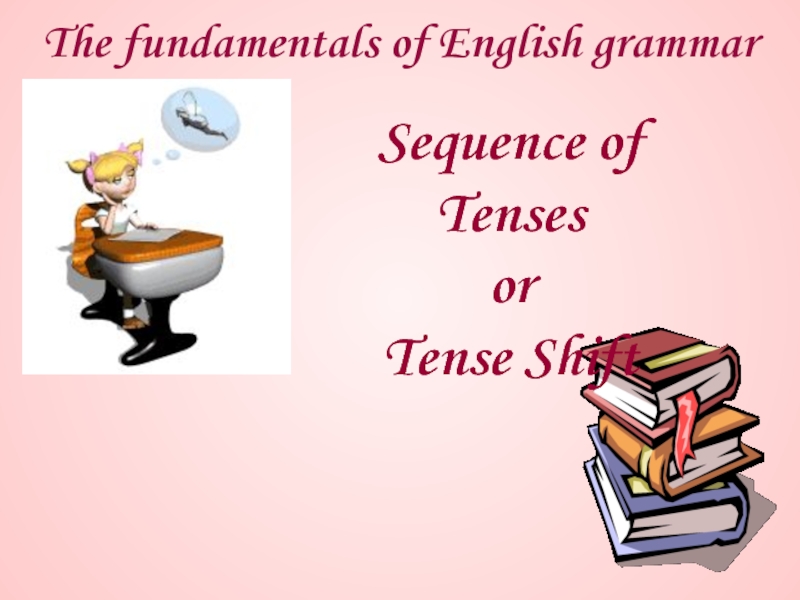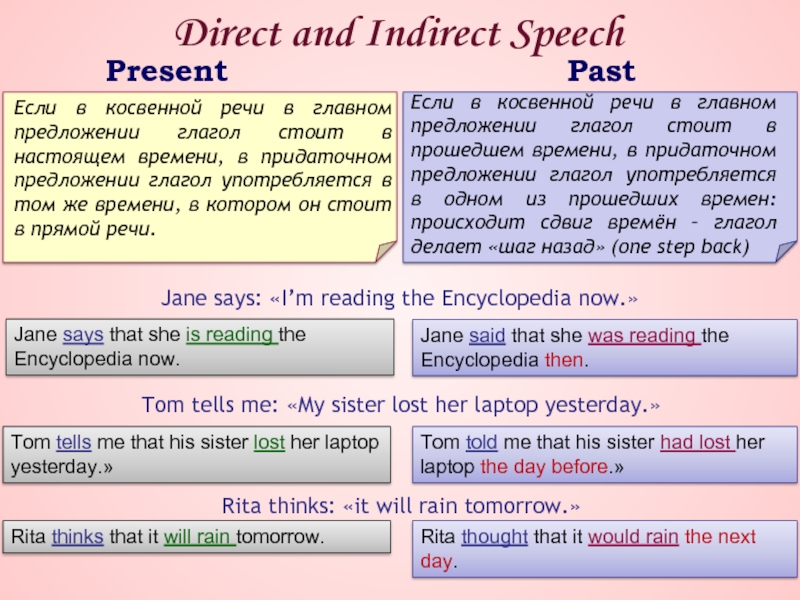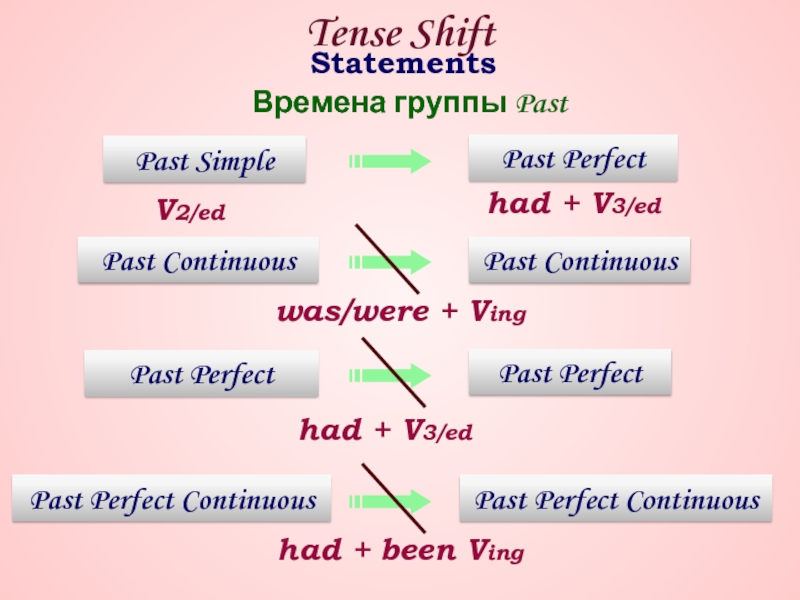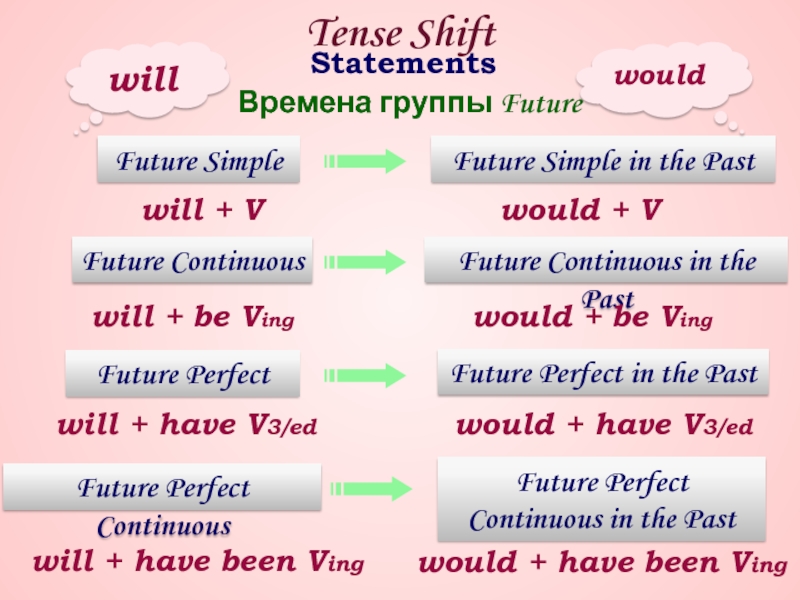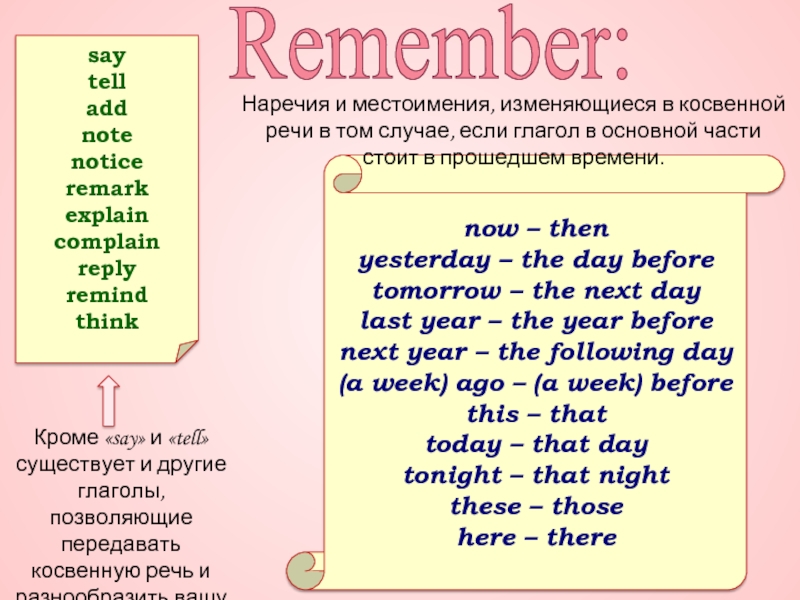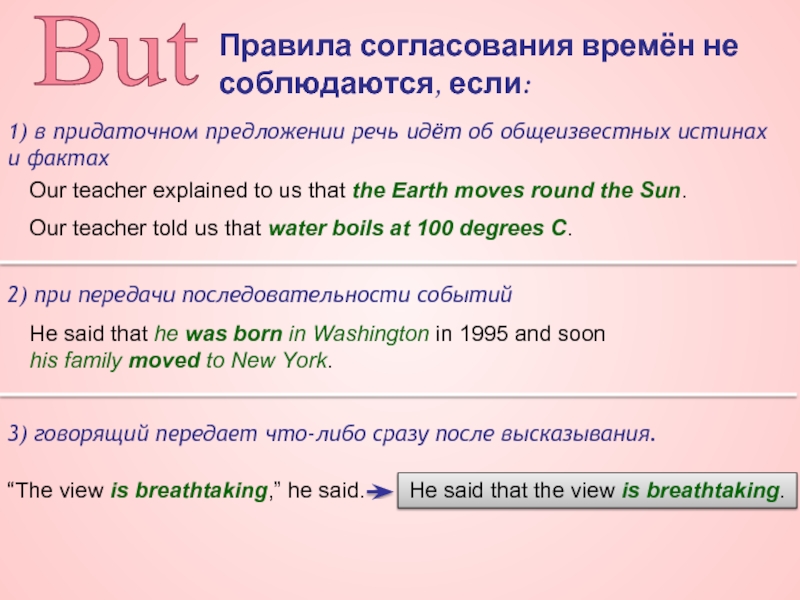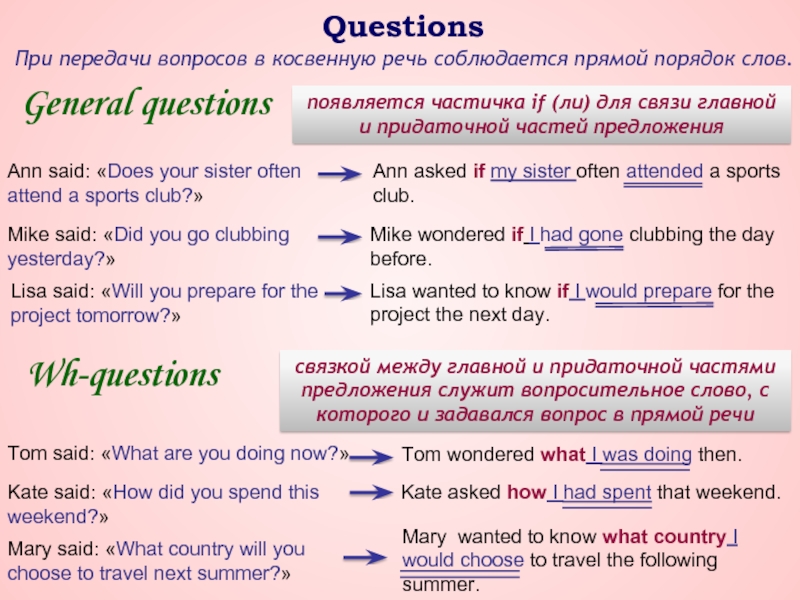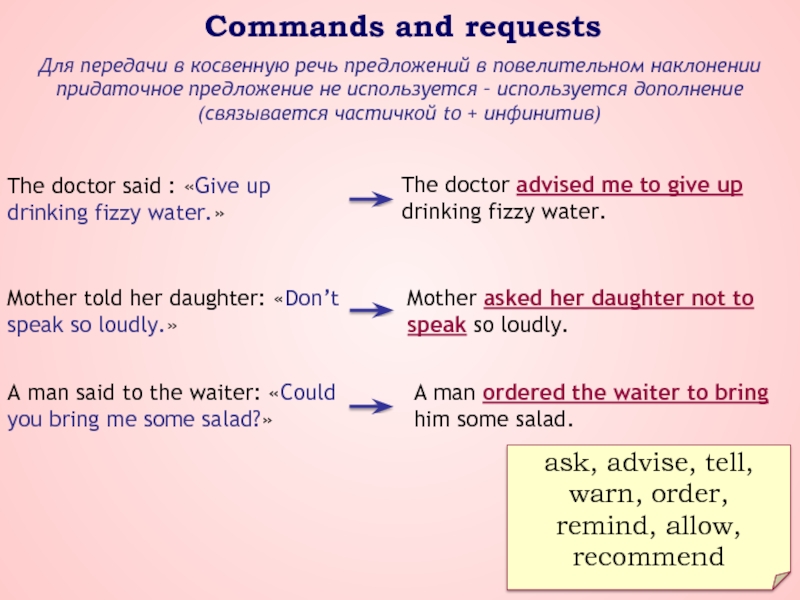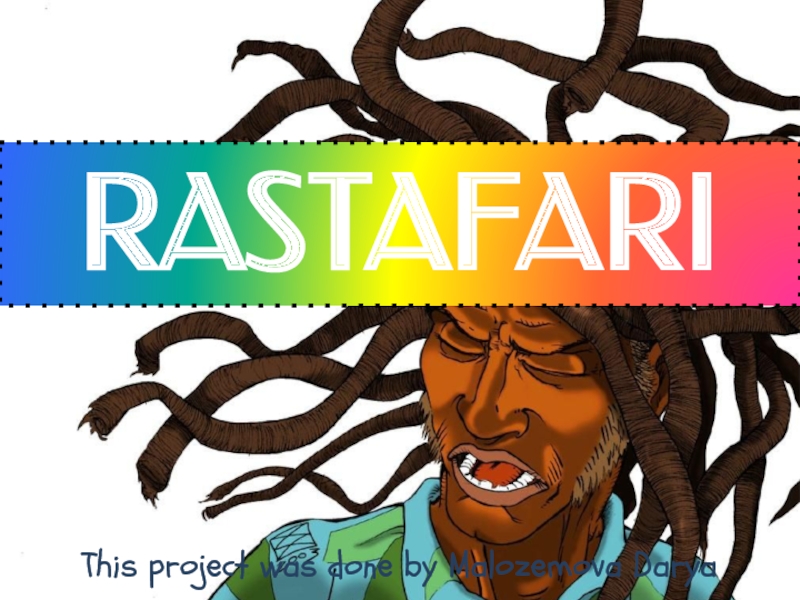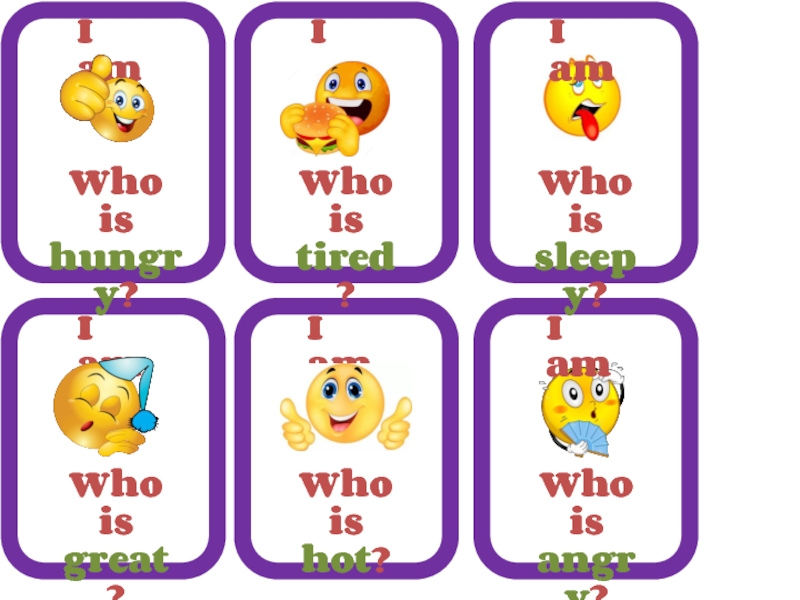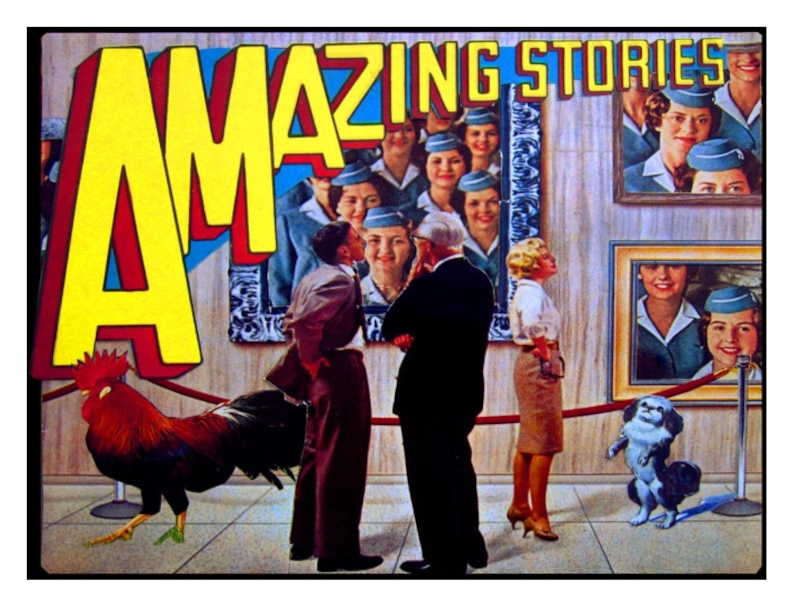- Главная
- Разное
- Дизайн
- Бизнес и предпринимательство
- Аналитика
- Образование
- Развлечения
- Красота и здоровье
- Финансы
- Государство
- Путешествия
- Спорт
- Недвижимость
- Армия
- Графика
- Культурология
- Еда и кулинария
- Лингвистика
- Английский язык
- Астрономия
- Алгебра
- Биология
- География
- Детские презентации
- Информатика
- История
- Литература
- Маркетинг
- Математика
- Медицина
- Менеджмент
- Музыка
- МХК
- Немецкий язык
- ОБЖ
- Обществознание
- Окружающий мир
- Педагогика
- Русский язык
- Технология
- Физика
- Философия
- Химия
- Шаблоны, картинки для презентаций
- Экология
- Экономика
- Юриспруденция
The fundamentals of english grammar. Sequence of tenses or tense shift презентация
Содержание
- 1. The fundamentals of english grammar. Sequence of tenses or tense shift
- 2. Если в косвенной речи в
- 3. Tense Shift Statements Present Simple Времена
- 4. Tense Shift Statements Past Simple Времена
- 5. Tense Shift Statements Future Simple Времена
- 6. Modal Verbs can – could may –
- 7. Remember: now – then yesterday – the
- 8. But Правила согласования времён не соблюдаются, если:
- 9. 5) В косвенной речи передаются придаточные условия
- 10. Questions General questions Wh-questions При передачи вопросов
- 11. Commands and requests Для передачи в косвенную
Слайд 2
Если в косвенной речи в главном предложении глагол стоит в настоящем
Direct and Indirect Speech
Если в косвенной речи в главном предложении глагол стоит в прошедшем времени, в придаточном предложении глагол употребляется в одном из прошедших времен: происходит сдвиг времён – глагол делает «шаг назад» (one step back)
Jane says that she is reading the Encyclopedia now.
Present
Past
Jane said that she was reading the Encyclopedia then.
Tom tells me that his sister lost her laptop yesterday.»
Tom told me that his sister had lost her laptop the day before.»
Jane says: «I’m reading the Encyclopedia now.»
Tom tells me: «My sister lost her laptop yesterday.»
Rita thinks: «it will rain tomorrow.»
Rita thinks that it will rain tomorrow.
Rita thought that it would rain the next day.
Слайд 3Tense Shift
Statements
Present Simple
Времена группы Present
Past Simple
Present Continuous
Past Continuous
Present
Present Perfect Continuous
Past Perfect
Past Perfect Continuous
V2/ed
V/Vs
is/am/are + Ving
was/were + Ving
had + V3/ed
have/has + V3/ed
had + been Ving
have/has+ been Ving
Слайд 4Tense Shift
Statements
Past Simple
Времена группы Past
Past Perfect
Past Continuous
Past Continuous
Past
Past Perfect Continuous
Past Perfect
Past Perfect Continuous
V2/ed
had + V3/ed
was/were + Ving
had + V3/ed
had + been Ving
Слайд 5Tense Shift
Statements
Future Simple
Времена группы Future
Future Continuous
Future Continuous in the
Future Perfect
Future Perfect Continuous
Future Perfect in the Past
Future Perfect Continuous in the Past
Future Simple in the Past
will
would
will + V
will + be Ving
will + have V3/ed
will + have been Ving
would + V
would + be Ving
would + have V3/ed
would + have been Ving
Слайд 6Modal Verbs
can – could
may – might
must – had to
have/has to –
should = should
ought to = ought to
Dan noted: «I can speak different foreign languages.»
Dan noted that he could speak different foreign languages.
Mary said: «I may buy a new phone tomorrow.»
Mary said that she might buy a new phone the next day.
Terry said: «I must consult my doctor next week.»
Terry said that he had to consult his doctor the following week.
Слайд 7Remember:
now – then
yesterday – the day before
tomorrow – the next day
last
next year – the following day
(a week) ago – (a week) before
this – that
today – that day
tonight – that night
these – those
here – there
say
tell
add
note
notice
remark
explain
complain
reply
remind
think
Кроме «say» и «tell» существует и другие глаголы, позволяющие передавать косвенную речь и разнообразить вашу речь.
Наречия и местоимения, изменяющиеся в косвенной речи в том случае, если глагол в основной части стоит в прошедшем времени.
Слайд 8But
Правила согласования времён не соблюдаются, если:
1) в придаточном предложении речь идёт
Our teacher explained to us that the Earth moves round the Sun.
Our teacher told us that water boils at 100 degrees C.
2) при передачи последовательности событий
He said that he was born in Washington in 1995 and soon his family moved to New York.
3) говорящий передает что-либо сразу после высказывания.
“The view is breathtaking,” he said.
He said that the view is breathtaking.
Слайд 95) В косвенной речи передаются придаточные условия 2 и 3 типа
“I wish I was a film star,” he said.
4) в придаточной части сложного предложения, имеющего союзы when и since
Mike said: «I haven’t met Susan since we went to the party.»
Mike said that he hadn’t met Susan since they went to the party.
He remarked: «She was crying when I came in.»
He remarked that she was crying when he came in.
He said he wished he was a film star.
Слайд 10Questions
General questions
Wh-questions
При передачи вопросов в косвенную речь соблюдается прямой порядок слов.
Ann
Ann asked if my sister often attended a sports club.
Mike said: «Did you go clubbing yesterday?»
появляется частичка if (ли) для связи главной и придаточной частей предложения
Mike wondered if I had gone clubbing the day before.
Lisa said: «Will you prepare for the project tomorrow?»
Lisa wanted to know if I would prepare for the project the next day.
связкой между главной и придаточной частями предложения служит вопросительное слово, с которого и задавался вопрос в прямой речи
Tom said: «What are you doing now?»
Tom wondered what I was doing then.
Kate said: «How did you spend this weekend?»
Kate asked how I had spent that weekend.
Mary said: «What country will you choose to travel next summer?»
Mary wanted to know what country I would choose to travel the following summer.
Слайд 11Commands and requests
Для передачи в косвенную речь предложений в повелительном наклонении
The doctor said : «Give up drinking fizzy water.»
The doctor advised me to give up drinking fizzy water.
Mother told her daughter: «Don’t speak so loudly.»
Mother asked her daughter not to speak so loudly.
A man said to the waiter: «Could you bring me some salad?»
A man ordered the waiter to bring him some salad.
ask, advise, tell,
warn, order,
remind, allow,
recommend
